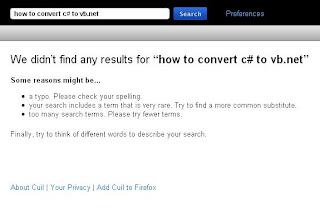"can
cuil overcome
google?"
That question crossed my mind after reading the article about cuil on
detikom.
As you can guess, cuil is search engine like google. According to the detikom, cuil is developed by Anna Patterson, ex google scientist, along with her husband, Tom Costello and few others ex google scientist. Costello claimed that with 120 billion web pages, cuil is much bigger than its rivals.
On
cuil's about us page, it explains that Cuil is an Irish word for knowledge, and it also stated the below:
Welcome to Cuil—the world’s biggest search engine. The Internet has grown. We think it’s time search did too.
The Internet has grown exponentially in the last fifteen years but search engines have not kept up—until now. Cuil searches more pages on the Web than anyone else—three times as many as Google and ten times as many as Microsoft.
Rather than rely on superficial popularity metrics, Cuil searches for and ranks pages based on their content and relevance. When we find a page with your keywords, we stay on that page and analyze the rest of its content, its concepts, their inter-relationships and the page’s coherency.
Then we offer you helpful choices and suggestions until you find the page you want and that you know is out there. We believe that analyzing the Web rather than our users is a more useful approach, so we don’t collect data about you and your habits, lest we are tempted to peek. With Cuil, your search history is always private.
Cuil is an old Irish word for knowledge. For knowledge, ask Cuil.
After goes through some searches using this two search engines, i conclude that google is still much much better than cuil on some ways.
Let's discuss in what extend i prefer google than cuil:
1. appearance


both of them has simple interface. it sure makes the loading more faster (if compare to yahoo), but what i dislike about cuil, is the color background. i have no idea why cuil choose black. i just feel my eyes is not comfortable with this (yet). on the other hand, google has a clean background and sometimes has a theme on its logo. i am always entertained by it.
(1 point go to google)
2. search by simple keyword
simple keyword here means that the keyword is in the domain name, e.g. google or cuil itself.
for this searching, i start with my blog keyword: "sugilee". As you can see in below image, cuil cannot find anything that match sugilee, meanwhile with google my blog is 5th of the list.


Probably you think that this is not fair as blogspot is belong to google. ok, let's try another one. this time i use my company name "starhub" as the keyword. Here is the result and see the different.


So where does the "120 billion pages" claim comes from????
(another point for google)
3. search by a question
For this purpose, i use question "how to convert c# to vb.net" as keyword. See the result...


(3-0 to google)
4. search by special keywords
I try to search a currency converter from SGD to IDR.


(4-0 to google)
Conclusion:
This is why google is called a smart ass search engine, it knows exactly what people are looking for and what people wish to search for. Google's inteligence is much beyond than cuil.
So to answer the question i raised before, there is an absolute NO for cuil to be able to overcome google (not now yet, probably)



 From one solid piece of aluminum comes a MacBook that’s thin and light, beautifully streamlined, and durable
From one solid piece of aluminum comes a MacBook that’s thin and light, beautifully streamlined, and durable Ultrathin 13.3-inch LED-backlit display.
Ultrathin 13.3-inch LED-backlit display.























